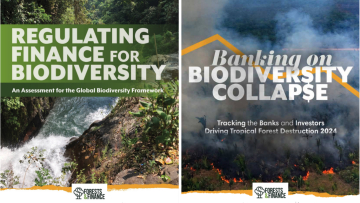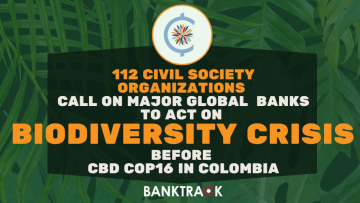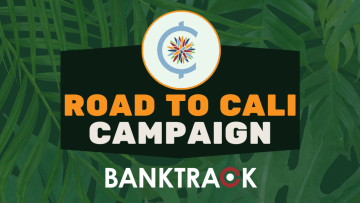The Road to Cali

Why this campaign?
In October 2024, governments from all over the world will convene in Cali, Colombia, for the 16th Conference of Parties (COP16) of the Convention on Biological Diversity (CBD). This Convention, agreed upon in 1992 and ratified by 196 countries, is the most important international treaty aimed at protecting nature and biodiversity. After agreeing in December 2022 on the so-called ‘Kunming-Montreal Global Biodiversity Framework’ (GBF), an elaborate global Action Plan containing 4 key goals and 23 targets to halt and reverse biodiversity loss before 2030, countries must now show in Cali how they will implement this plan at home.
The GBF framework puts unprecedented responsibility also on the financial sector to help safeguard our planet’s biodiversity. Target 14 requires that all governments work towards “progressively aligning all relevant public and private activities, fiscal and financial flows with the GBF”. It calls for a comprehensive integration of biodiversity considerations into all financial and economic activities, ensuring that they align with preserving life on Earth. Additionally, Target 15 stresses the importance of corporate transparency, mandating that legal, administrative, or policy measures ensure financial institutions transparently assess and disclose their biodiversity impacts and work towards reducing these impacts. Other targets, such as GBF Targets 1-3 referring to land use, indirectly impact bank financing of business activities in the high-biodiversity areas.
While it is up to governments to turn GBF into reality, urgent and decisive action is required from all sectors of society, banks included, to halt the ongoing unravelling of the web of life. Banks are uniquely placed to do so as they provide financial services to business activities that continue to destroy the last remaining natural ecosystems on the Planet. Currently, private financial flows directed toward activities directly harming nature exceed the private financial flows for nature conservation and restoration by an astonishing 140-fold margin. According to UNEP estimates, nature-negative financial flows amounted to at least US$5 trillion in 2022.
What banks must do?
Most importantly, banks must publicly support such financial sector regulation, which will establish a level playing field with mandatory rules on social and environmental impacts, ensuring transparency and accountability. Such regulation is essential for protecting ecosystems but also reduces uncertainty, prevents market failures, and ensures fair competition.
In addition, banks must take up responsibility to align their own business with the goals and targets of the GBF. Concretely, banks must:
-
Publicly acknowledge, if not already, the scale and depth of the biodiversity crisis and the distinct responsibility of banks to stop the money flow to activities that destroy biodiversity.
-
Explicitly and publicly commit, if not already, to aligning all business activities with the 2030 goals and targets of the GBF.
-
Publish transition plans aimed at progressively reducing the negative impacts of finance on biodiversity and ecosystems and increasing positive impacts, including robust, time-bound goals and targets for aligning all policies and financing activities with the GBF targets.
-
Strengthen exclusions by prohibiting harmful activities in the eight no-go areas identified by the Banks and Biodiversity Initiative.
-
Exclude finance for high-risk business sectors that have no potential or credible transition pathway towards alignment with the GBF goals.
-
Break ties with rogue client companies that fail to end and provide remedy for environmental and human rights abuses.
-
Acknowledge the role of Indigenous Peoples as prime custodians of their biodiverse lands and territories and establish or strengthen policies and procedures that respect and uphold Indigenous rights, including their right to free, prior, and informed consent (FPIC).
-
Maintain zero tolerance towards violence and the criminalisation of land, environmental, and human rights defenders in connection to their own operations or their business relationships.
-
Comprehensively monitor, assess, and disclose biodiversity risks, impacts, and dependencies, along with policy planning and target setting to reduce those impacts and dependencies, with clear goals and timelines; report on performance against those targets and on any actions taken towards clients negatively impacting nature.
-
Install robust accountability frameworks and develop or participate in grievance mechanisms to provide remedy for adverse environmental and human rights impacts, aligned with United Nations Guiding Principles (UNGP) effectiveness criteria.
-
Reject false solutions to the biodiversity crisis, including market mechanisms based on the financialisation of nature, land, and land grabbing, ecosystem services, biodiversity markets, and corporate-led initiatives like the Taskforce on Nature-Related Financial Disclosures (TNFD).
Role of BankTrack
Successful implementation of the GBF must be led by governments but it needs a whole society approach. This entails active involvement from Indigenous Peoples, local communities, women, youth, civil society organisations, private businesses, and financial institutions to do their part in moving us closer to a world in which, as stated in the GBF, “biodiversity is valued, conserved, restored and wisely used, maintaining ecosystem services, sustaining a healthy planet and delivering benefits essential for all people”
BankTrack plays its role as a civil society watchdog of commercial banks, challenging them to act urgently and decisively to stop financing activities that cause biodiversity loss and to put nature on a path to recovery. We consider COP 16 in Colombia as a vital opportunity to raise awareness about the pivotal role of banks in ecosystem destruction, and potentially restoration. We are committed to leveraging this platform to draw attention to the alarming trend of financing nature destruction and persist in our advocacy efforts against false solutions like biodiversity offsets and other creative financial instruments that perpetuate the destruction of life on Earth.











